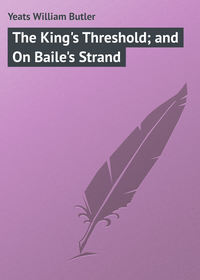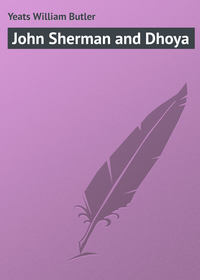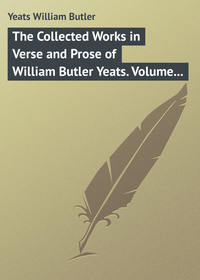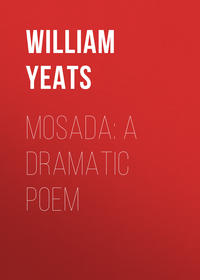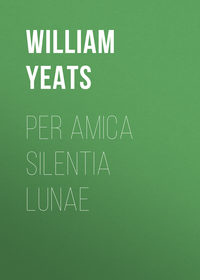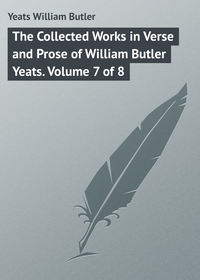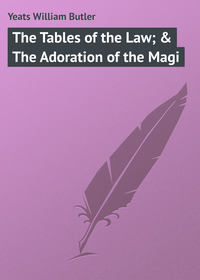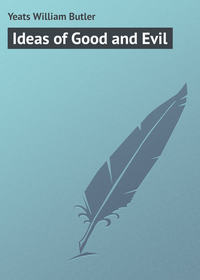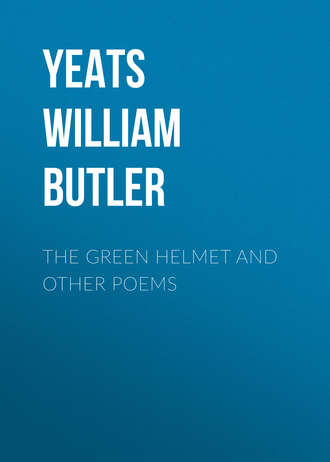 полная версия
полная версияThe Green Helmet and Other Poems

William Butler Yeats
The Green Helmet and Other Poems
HIS DREAM
Crying amid the glittering sea,Naming it with ecstatic breath,Because it had such dignityBy the sweet name of Death.Though I’d my finger on my lip,What could I but take up the song?And fish and crowd and gaudy shipCried out the whole night long,And fishes bubbling to the brimCried out upon that thing beneath,It had such dignity of limb,By the sweet name of Death.And though I would have hushed the crowdThere was no mother’s son but said,“What is the figure in a shroudUpon a gaudy bed?”I swayed upon the gaudy sternThe butt end of a steering oar,And everywhere that I could turnMen ran upon the shore.A WOMAN HOMER SUNG
For she had fiery bloodWhen I was young,And trod so sweetly proudAs ’twere upon a cloud,A woman Homer sung,That life and letters seemBut an heroic dream.Whereon I wrote and wrought,And now, being gray,I dream that I have broughtTo such a pitch my thoughtThat coming time can say,“He shadowed in a glassWhat thing her body was.”If any man drew nearWhen I was young,I thought, “He holds her dear,”And shook with hate and fear.But oh, ’twas bitter wrongIf he could pass her byWith an indifferent eye.THAT THE NIGHT COME
She lived in storm and strife.Her soul had such desireFor what proud death may bringThat it could not endureThe common good of life,But lived as ’twere a kingThat packed his marriage dayWith banneret and pennon,Trumpet and kettledrum,And the outrageous cannon,To bundle Time awayThat the night come.THE CONSOLATION
That had she done so who can sayWhat would have shaken from the sieve?I might have thrown poor words awayAnd been content to live.That every year I have cried, “At lengthMy darling understands it all,Because I have come into my strength,And words obey my call.”And I grew weary of the sunUntil my thoughts cleared up again,Remembering that the best I have doneWas done to make it plain;I had this thought awhile ago,“My darling cannot understandWhat I have done, or what would doIn this blind bitter land.”FRIENDS
Now must I these three praise —Three women that have wroughtWhat joy is in my days;One that no passing thought,Nor those unpassing cares,No, not in these fifteenMany times troubled years,Could ever come betweenHeart and delighted heart;And one because her handHad strength that could unbindWhat none can understand,What none can have and thrive,Youth’s dreamy load, till sheSo changed me that I liveLabouring in ecstasy.And what of her that tookAll till my youth was goneWith scarce a pitying look?How should I praise that one?When day begins to breakI count my good and bad,Being wakeful for her sake,Remembering what she had,What eagle look still shows,While up from my heart’s rootSo great a sweetness flowsI shake from head to foot.NO SECOND TROY
Why should I blame her that she filled my daysWith misery, or that she would of lateHave taught to ignorant men most violent ways,Or hurled the little streets upon the great,Had they but courage equal to desire?What could have made her peaceful with a mindThat nobleness made simple as a fire,With beauty like a tightened bow, a kindThat is not natural in an age like this,Being high and solitary and most stern?Why, what could she have done being what she is?Was there another Troy for her to burn?RECONCILIATION
Some may have blamed you that you took awayThe verses that could move them on the dayWhen, the ears being deafened, the sight of the eyes blindWith lightning you went from me, and I could findNothing to make a song about but kings,Helmets, and swords, and half-forgotten thingsThat were like memories of you – but nowWe’ll out, for the world lives as long ago;And while we’re in our laughing, weeping fit,Hurl helmets, crowns, and swords into the pit.But, dear, cling close to me; since you were gone,My barren thoughts have chilled me to the bone.KING AND NO KING
“Would it were anything but merely voice!”The No King cried who after that was King,Because he had not heard of anythingThat balanced with a word is more than noise;Yet Old Romance being kind, let him prevailSomewhere or somehow that I have forgot,Though he’d but cannon – Whereas we that had thoughtTo have lit upon as clean and sweet a taleHave been defeated by that pledge you gaveIn momentary anger long ago;And I that have not your faith, how shall I knowThat in the blinding light beyond the graveWe’ll find so good a thing as that we have lost?The hourly kindness, the day’s common speech,The habitual content of each with eachWhen neither soul nor body has been crossed.THE COLD HEAVEN
Suddenly I saw the cold and rook delighting HeavenThat seemed as though ice burned and was but the more ice,And thereupon imagination and heart were drivenSo wild, that every casual thought of that and thisVanished, and left but memories, that should be out of seasonWith the hot blood of youth, of love crossed long ago;And I took all the blame out of all sense and reason,Until I cried and trembled and rocked to and fro,Riddled with light. Ah! when the ghost begins to quicken,Confusion of the death-bed over, is it sentOut naked on the roads, as the books say, and strickenBy the injustice of the skies for punishment?PEACE
Ah, that Time could touch a formThat could show what Homer’s ageBred to be a hero’s wage.“Were not all her life but storm,Would not painters paint a formOf such noble lines” I said.“Such a delicate high head,So much sternness and such charm,Till they had changed us to like strength?”Ah, but peace that comes at length,Came when Time had touched her form.AGAINST UNWORTHY PRAISE
O heart, be at peace, becauseNor knave nor dolt can breakWhat’s not for their applause,Being for a woman’s sake.Enough if the work has seemed,So did she your strength renew,A dream that a lion had dreamedTill the wilderness cried aloud,A secret between you two,Between the proud and the proud.What, still you would have their praise!But here’s a haughtier text,The labyrinth of her daysThat her own strangeness perplexed;And how what her dreaming gaveEarned slander, ingratitude,From self-same dolt and knave;Aye, and worse wrong than these.Yet she, singing upon her road,Half lion, half child, is at peace.THE FASCINATION OF WHAT’S DIFFICULT
The fascination of what’s difficultHas dried the sap out of my veins, and rentSpontaneous joy and natural contentOut of my heart. There’s something ails our coltThat must, as if it had not holy blood,Nor on an Olympus leaped from cloud to cloud,Shiver under the lash, strain, sweat and joltAs though it dragged road metal. My curse on playsThat have to be set up in fifty ways,On the day’s war with every knave and dolt,Theatre business, management of men.I swear before the dawn comes round againI’ll find the stable and pull out the bolt.A DRINKING SONG
Wine comes in at the mouthAnd love comes in at the eye;That’s all we shall know for truthBefore we grow old and die.I lift the glass to my mouth,I look at you, and I sigh.THE COMING OF WISDOM WITH TIME
Though leaves are many, the root is one;Through all the lying days of my youthI swayed my leaves and flowers in the sun;Now I may wither into the truth.ON HEARING THAT THE STUDENTS OF OUR NEW UNIVERSITY HAVE JOINED THE ANCIENT ORDER OF HIBERNIANS AND THE AGITATION AGAINST IMMORAL LITERATURE
Where, where but here have Pride and Truth,That long to give themselves for wage,To shake their wicked sides at youthRestraining reckless middle-age.TO A POET, WHO WOULD HAVE ME PRAISE CERTAIN BAD POETS, IMITATORS OF HIS AND MINE
You say, as I have often given tongueIn praise of what another’s said or sung,’Twere politic to do the like by these;But where’s the wild dog that has praised his fleas?THE ATTACK ON THE “PLAY BOY”
Once, when midnight smote the air,Eunuchs ran through Hell and metRound about Hell’s gate, to stareAt great Juan riding by,And like these to rail and sweat,Maddened by that sinewy thigh.A LYRIC FROM AN UNPUBLISHED PLAY
“Put off that mask of burning goldWith emerald eyes.”“O no, my dear, you make so boldTo find if hearts be wild and wise,And yet not cold.”“I would but find what’s there to find,Love or deceit.”“It was the mask engaged your mind,And after set your heart to beat,Not what’s behind.”“But lest you are my enemy,I must enquire.”“O no, my dear, let all that be,What matter, so there is but fireIn you, in me?”UPON A HOUSE SHAKEN BY THE LAND AGITATION
How should the world be luckier if this house,Where passion and precision have been oneTime out of mind, became too ruinousTo breed the lidless eye that loves the sun?And the sweet laughing eagle thoughts that growWhere wings have memory of wings, and allThat comes of the best knit to the best? AlthoughMean roof-trees were the sturdier for its fall,How should their luck run high enough to reachThe gifts that govern men, and after theseTo gradual Time’s last gift, a written speechWrought of high laughter, loveliness and ease?AT THE ABBEY THEATRE
Imitated from RonsardDear Craoibhin Aoibhin, look into our case.When we are high and airy hundreds sayThat if we hold that flight they’ll leave the place,While those same hundreds mock another dayBecause we have made our art of common things,So bitterly, you’d dream they longed to lookAll their lives through into some drift of wings.You’ve dandled them and fed them from the bookAnd know them to the bone; impart to us —We’ll keep the secret – a new trick to please.Is there a bridle for this ProteusThat turns and changes like his draughty seas?Or is there none, most popular of men,But when they mock us that we mock again?THESE ARE THE CLOUDS
These are the clouds about the fallen sun,The majesty that shuts his burning eye;The weak lay hand on what the strong has done,Till that be tumbled that was lifted highAnd discord follow upon unison,And all things at one common level lie.And therefore, friend, if your great race were runAnd these things came, so much the more therebyHave you made greatness your companion,Although it be for children that you sigh:These are the clouds about the fallen sun,The majesty that shuts his burning eye.AT GALWAY RACES
Out yonder, where the race course is,Delight makes all of the one mind,Riders upon the swift horses,The field that closes in behind:We, too, had good attendance once,Hearers and hearteners of the work;Aye, horsemen for companions,Before the merchant and the clerkBreathed on the world with timid breath.Sing on: sometime, and at some new moon,We’ll learn that sleeping is not death,Hearing the whole earth change its tune,Its flesh being wild, and it againCrying aloud as the race course is,And we find hearteners among menThat ride upon horses.A FRIEND’S ILLNESS
Sickness brought me thisThought, in that scale of his:Why should I be dismayedThough flame had burned the wholeWorld, as it were a coal,Now I have seen it weighedAgainst a soul?ALL THINGS CAN TEMPT ME
All things can tempt me from this craft of verse:One time it was a woman’s face, or worse —The seeming needs of my fool-driven land;Now nothing but comes readier to the handThan this accustomed toil. When I was young,I had not given a penny for a songDid not the poet sing it with such airsThat one believed he had a sword upstairs;Yet would be now, could I but have my wish,Colder and dumber and deafer than a fish.THE YOUNG MAN’S SONG
I whispered, “I am too young,”And then, “I am old enough,”Wherefore I threw a pennyTo find out if I might love;“Go and love, go and love, young man,If the lady be young and fair,”Ah, penny, brown penny, brown penny,I am looped in the loops of her hair.Oh love is the crooked thing,There is nobody wise enoughTo find out all that is in it,For he would be thinking of loveTill the stars had run away,And the shadows eaten the moon;Ah, penny, brown penny, brown penny,One cannot begin it too soon.THE GREEN HELMET
An Heroic FarceTHE PERSONS OF THE PLAY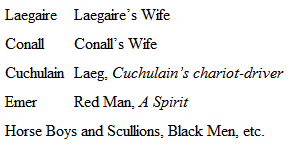
Scene: A house made of logs. There are two windows at the back and a door which cuts off one of the corners of the room. Through the door one can see low rocks which make the ground outside higher than it is within, and beyond the rocks a misty moon-lit sea. Through the windows one can see nothing but the sea. There is a great chair at the opposite side to the door, and in front of it a table with cups and a flagon of ale. Here and there are stools.
At the Abbey Theatre the house is orange red and the chairs and tables and flagons black, with a slight purple tinge which is not clearly distinguishable from the black. The rocks are black with a few green touches. The sea is green and luminous, and all the characters except the Red Man and the Black Men are dressed in various shades of green, one or two with touches of purple which look nearly black. The Black Men all wear dark purple and have eared caps, and at the end their eyes should look green from the reflected light of the sea. The Red Man is altogether in red. He is very tall, and his height increased by horns on the Green Helmet. The effect is intentionally violent and startling.
LaegaireWhat is that? I had thought that I saw, though but in the wink of an eye,A cat-headed man out of Connaught go pacing and spitting by;But that could not be.ConallYou have dreamed it – there’s nothing out there.I killed them all before daybreak – I hoked them out of their lair;I cut off a hundred heads with a single stroke of my sword,And then I danced on their graves and carried away their hoard.LaegaireDoes anything stir on the sea?ConallNot even a fish or a gull:I can see for a mile or two, now that the moon’s at the full.[A distant shout.]
LaegaireAh – there – there is someone who calls us.ConallBut from the landward side,And we have nothing to fear that has not come up from the tide;The rocks and the bushes cover whoever made that noise,But the land will do us no harm.LaegaireIt was like Cuchulain’s voice.ConallBut that’s an impossible thing.LaegaireAn impossible thing indeed.ConallFor he will never come home, he has all that he could needIn that high windy Scotland – good luck in all that he does.Here neighbour wars on neighbour and why there is no man knows,And if a man is lucky all wish his luck away,And take his good name from him between a day and a day.LaegaireI would he’d come for all that, and make his young wife knowThat though she may be his wife, she has no right to goBefore your wife and my wife, as she would have gone last nightHad they not caught at her dress, and pulled her as was right;And she makes light of us though our wives do all that they can.She spreads her tail like a peacock and praises none but her man.ConallA man in a long green cloak that covers him up to the chin Comes down through the rocks and hazels.LaegaireCry out that he cannot come in.ConallHe must look for his dinner elsewhere, for no one alive shall stop Where a shame must alight on us two before the dawn is up.LaegaireNo man on the ridge of the world must ever know that but us two.Conall[Outside door]
Go away, go away, go away.Young Man[Outside door]
I will go when the night is through And I have eaten and slept and drunk to my heart’s delight.ConallA law has been made that none shall sleep in this house to-night.Young ManWho made that law?ConallWe made it, and who has so good a right?Who else has to keep the house from the Shape-Changers till day?Young ManThen I will unmake the law, so get you out of the way.[He pushes past Conall and goes into house]
ConallGo out – if you have your wits, go out,A stone’s throw further on you will find a big house whereOur wives will give you supper, and you’ll sleep sounder there,For it’s a luckier house.LaegaireGo out – if you have your wits, go out, A stone’s throw further on you will find a big house whereOur wives will give you supper, and you’ll sleep sounder there,For it’s a luckier house.Young ManI’ll eat and sleep where I will.LaegaireGo out or I will make you.Young Man[Forcing up Laegaire’s arm, passing him and putting his shield on the wall over the chair]
Not till I have drunk my fill.But may some dog defend me for a cat of wonder’s up.Laegaire and Conall are here, the flagon full to the top,And the cups —LaegaireIt is Cuchulain.CuchulainThe cups are dry as a bone.[He sits on chair and drinks]
ConallGo into Scotland again, or where you will, but begone From this unlucky country that was made when the devil spat.CuchulainIf I lived here a hundred years, could a worse thing come than that Laegaire and Conall should know me and bid me begone to my face?ConallWe bid you begone from a house that has fallen on shame and disgrace.CuchulainI am losing patience, Conall – I find you stuffed with pride,The flagon full to the brim, the front door standing wide;You’d put me off with words, but the whole thing’s plain enough,You are waiting for some message to bring you to war or loveIn that old secret country beyond the wool-white waves,Or it may be down beneath them in foam-bewildered cavesWhere nine forsaken sea queens fling shuttles to and fro;But beyond them, or beneath them, whether you will or no,I am going too.LaegaireBetter tell it all out to the end;He was born to luck in the cradle, his good luck may amend The bad luck we were born to.ConallI’ll lay the whole thing bare. You saw the luck that he had when he pushed in past me there.Does anything stir on the sea?LaegaireNot even a fish or a gull.ConallYou were gone but a little while.We were there and the ale-cup full.We were half drunk and merry, and midnight on the stroke When a wide, high man came in with a red foxy cloak,With half-shut foxy eyes and a great laughing mouth,And he said when we bid him drink, that he had so great a drouthHe could drink the sea.CuchulainI thought he had come from one of youOut of some Connaught rath, and would lap up milk and mew;But if he so loved water I have the tale awry.ConallYou would not be so merry if he were standing by,For when we had sung or danced as he were our next of kinHe promised to show us a game, the best that ever had been;And when we had asked what game, he answered, “Why, whip off my head!Then one of you two stoop down, and I’ll whip off his,” he said.“A head for a head,” he said, “that is the game that I play.”CuchulainHow could he whip off a head when his own had been whipped away?ConallWe told him it over and over, and that ale had fuddled his wit,But he stood and laughed at us there, as though his sides would split,Till I could stand it no longer, and whipped off his head at a blow,Being mad that he did not answer, and more at his laughing so,And there on the ground where it fell it went on laughing at me.LaegaireTill he took it up in his hands —ConallAnd splashed himself into the sea.CuchulainI have imagined as good when I’ve been as deep in the cup.LaegaireYou never did.CuchulainAnd believed it.ConallCuchulain, when will you stopBoasting of your great deeds, and weighing yourself with us two,And crying out to the world whatever we say or do,That you’ve said or done a better? – Nor is it a drunkard’s tale,Though we said to ourselves at first that it all came out of the ale,And thinking that if we told it we should be a laughing-stock,Swore we should keep it secret.LaegaireBut twelve months upon the clock.ConallA twelvemonth from the first time.LaegaireAnd the jug full up to the brim:For we had been put from our drinking by the very thought of him.ConallWe stood as we’re standing now.LaegaireThe horns were as empty.ConallWhenHe ran up out of the sea with his head on his shoulders again.CuchulainWhy, this is a tale worth telling.ConallAnd he called for his debt and his right,And said that the land was disgraced because of us two from that nightIf we did not pay him his debt.LaegaireWhat is there to be saidWhen a man with a right to get it has come to ask for your head?ConallIf you had been sitting there you had been silent like us.LaegaireHe said that in twelve months more he would come again to this houseAnd ask his debt again. Twelve months are up to-day.ConallHe would have followed after if we had run away.LaegaireWill he tell every mother’s son that we have broken our word?CuchulainWhether he does or does not we’ll drive him out with the sword,And take his life in the bargain if he but dare to scoff.ConallHow can you fight with a head that laughs when you’ve whipped it off?LaegaireOr a man that can pick it up and carry it out in his hand?ConallHe is coming now, there’s a splash and a rumble along the strandAs when he came last.CuchulainCome, and put all your backs to the door.[A tall, red-headed, red-cloaked man stands upon the threshold against the misty green of the sea; the ground, higher without than within the house, makes him seem taller even than he is. He leans upon a great two-handed sword]
LaegaireIt is too late to shut it, for there he stands once moreAnd laughs like the sea.CuchulainOld herring – You whip off heads! Why, thenWhip off your own, for it seems you can clap it on again.Or else go down in the sea, go down in the sea, I say,Find that old juggler Manannan and whip his head away;Or the Red Man of the Boyne, for they are of your own sort,Or if the waves have vexed you and you would find a sportOf a more Irish fashion, go fight without a restA caterwauling phantom among the winds of the west.But what are you waiting for? into the water, I say!If there’s no sword can harm you, I’ve an older trick to play,An old five-fingered trick to tumble you out of the place;I am Sualtim’s son Cuchulain – what, do you laugh in my face?Red ManSo you too think me in earnest in wagering poll for poll!A drinking joke and a gibe and a juggler’s feat, that is all,To make the time go quickly – for I am the drinker’s friend,The kindest of all Shape-Changers from here to the world’s end,The best of all tipsy companions. And now I bring you a gift:I will lay it there on the ground for the best of you all to lift,[He lays his Helmet on the ground]
And wear upon his own head, and choose for yourselves the best.O! Laegaire and Conall are brave, but they were afraid of my jest.Well, maybe I jest too grimly when the ale is in the cup.There, I’m forgiven now —[Then in a more solemn voice as he goes out]
Let the bravest take it up.[Conall takes up Helmet and gazes at it with delight]
Laegaire[Singing, with a swaggering stride]
Laegaire is best;Between water and hill,He fought in the westWith cat heads, untilAt the break of dayAll fell by his sword,And he carried awayTheir hidden hoard.[He seizes the Helmet]
ConallGive it me, for what did you find in the bagBut the straw and the broken delf and the bits of dirty ragYou’d taken for good money?CuchulainNo, no, but give it me.[He takes Helmet]
ConallThe Helmet’s mine or Laegaire’s – you’re the youngest of us three.Cuchulain[Filling Helmet with ale]
I did not take it to keep it – the Red Man gave it for one,But I shall give it to all – to all of us three or to none;That is as you look upon it – we will pass it to and fro,And time and time about, drink out of it and soStroke into peace this cat that has come to take our lives.Now it is purring again, and now I drink to your wives,And I drink to Emer, my wife.[A great noise without and shouting]
Why, what in God’s name is that noise?ConallWhat else but the charioteers and the kitchen and stable boysShouting against each other, and the worst of all is your own,That chariot-driver, Laeg, and they’ll keep it up till the dawn,And there’s not a man in the house that will close his eyes to-night,Or be able to keep them from it, or know what set them to fight.[A noise of horns without]
There, do you hear them now? such hatred has each for eachThey have taken the hunting horns to drown one other’s speechFor fear the truth may prevail. – Here’s your good health and long life,And, though she be quarrelsome, good health to Emer, your wife.[The Charioteers, Stable Boys and Kitchen Boys come running in. They carry great horns, ladles and the like]


